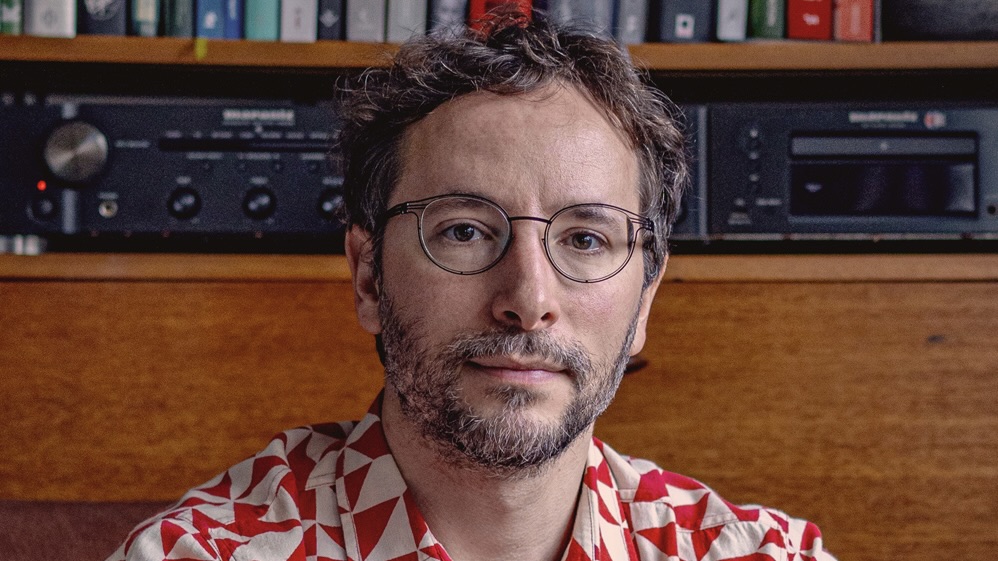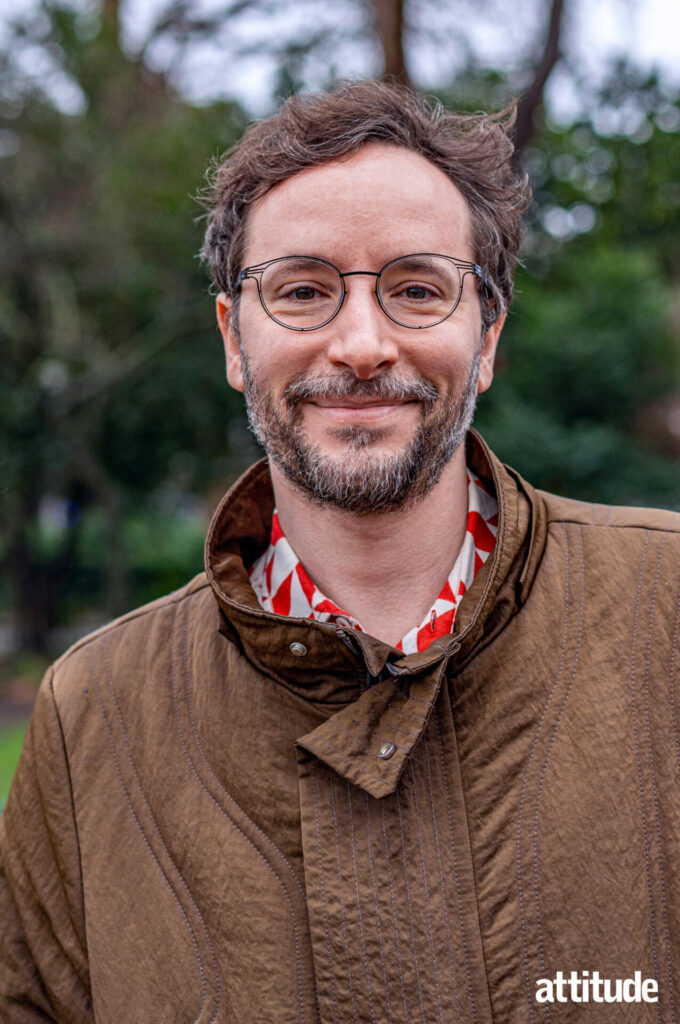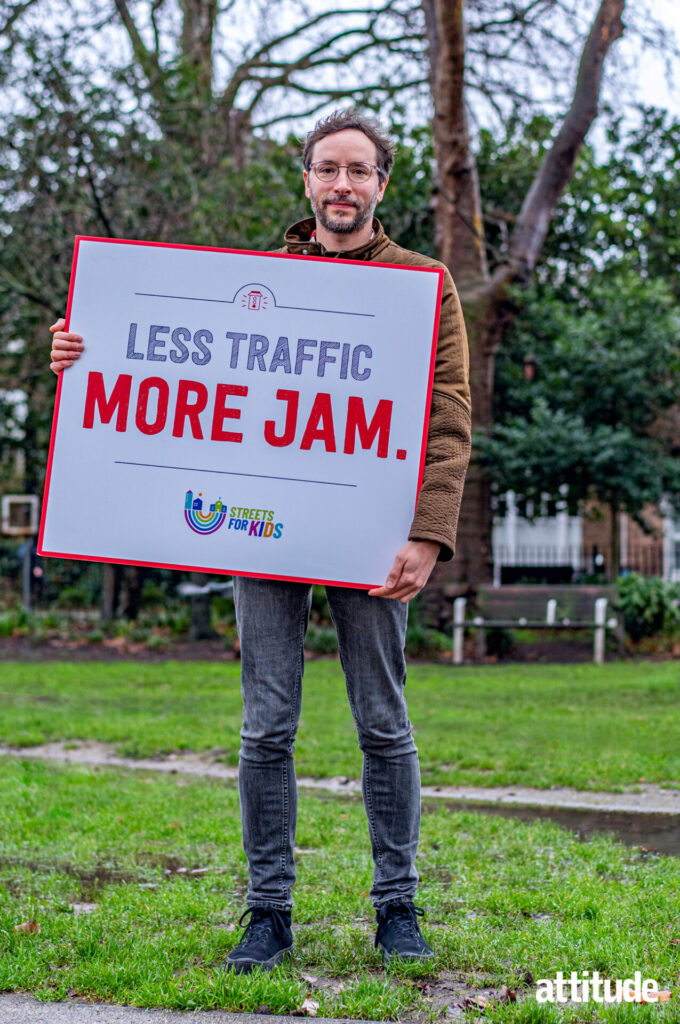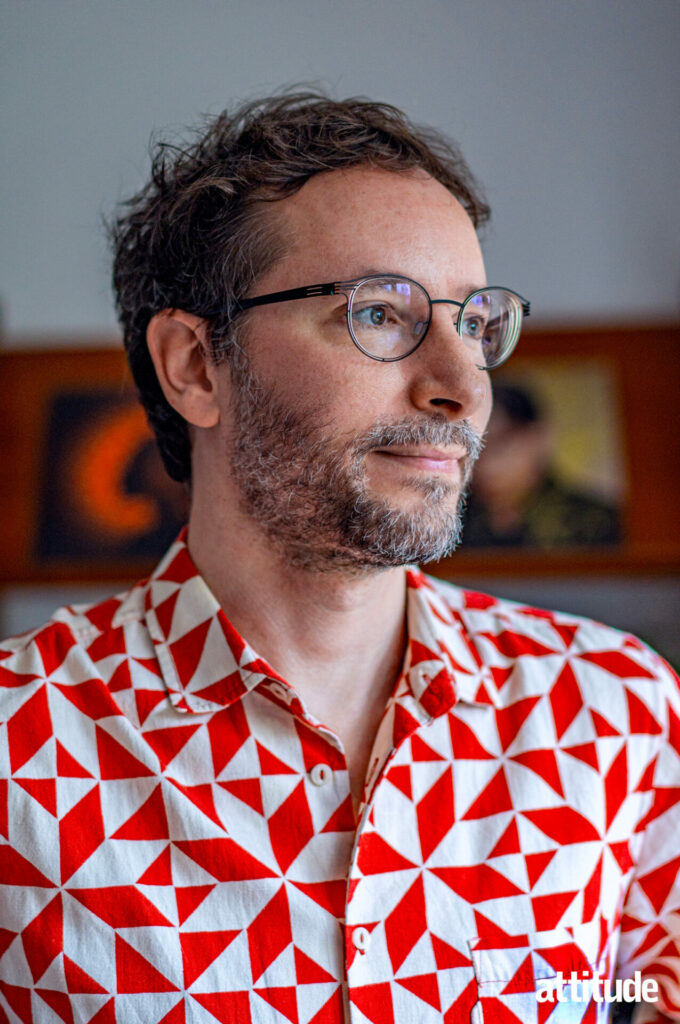Meet eco-campaigner Oliver Lord, who is fighting to clean the air we breathe
Environmentalist Oliver Lord is encouraging cycling and implementing London’s controversial Ultra-Low Emission Zone for clean air.
By Dino Bonacic

As a specialist in clean air and sustainable transport, Oliver Lord, a 38-year-old environmental campaigner, and gay man is at the forefront of improving our environment in the UK. In his current role as UK head of campaigns for international charity Clean Cities Campaign (CCC), Oliver — or Oli to most people — is helping to influence public opinion as well as maintaining the pressure on key decision-makers who form air-quality policies.
In doing so, we felt it fitting that he lead the Science, Technology, Engineering, and Mathematics category in Attitude 101, empowered by Bentley, our list of 101 influential LGBTQs.
Air is essential to human life — we all know this. Yet because we can’t see it, it’s the one element at the core of our existence whose quality has historically been the least controlled. It sounds obvious, but you wouldn’t drink tap water if it was brown, or eat food that was rotten, or sleep in an unsafe environment. But polluted air is all around us and we have no choice but to take it in.
In 2018, the UK government named poor air quality as the “largest environmental risk to public health in the UK”, causing chronic conditions and reducing life expectancy. And research conducted in 2019 by analyst platform State of Global Air showed that air pollution accounts for more than one in nine deaths around the world.

Cities, of course, are pollution hotspots, making them increasingly unhealthy places to live. “We are about applying positive pressure onto the leaders of big cities; shaping a pathway to what we call zero-emission mobility. This means being able to go around the city without having to harm the planet at the same time,” he tells me. He then adds: “I would never want the campaign that I work for to come across like we’re asking people not to do things or not to go out. It’s about putting options on the table that help people move in the best way possible.”
As part of his campaigning work, Oli speaks out about the inequitable impact air pollution has on marginalised communities. “If you’re on the breadline, you’re more likely to live on some of the city’s busiest roads, breathing in pollution. It ends up spiralling into a Catch-22,” he says.
Prior to his CCC position, Oli built his experience on the other side of the pollution conversation, in the public sector. After finishing his psychology degree, he joined Transport for London (TfL) on a 2008 graduate scheme. Incidentally, this was a crucial time for the UK capital — aka the ‘Big Smoke’ — as initial conversations around the Ultra Low Emission Zone (ULEZ) were just beginning. “When first discussing it, we had to fight the battle internally at TfL, as many people were saying that air pollution was not that much of a problem. We had to make it a priority. I was surrounded by mostly straight male engineers and traffic modellers — people who felt like they knew it all. I definitely felt a bit out of place, like I had to make my mark in a different way.”
“It’s rewarding that I get to walk around the streets and see things that are a result of the work that I was doing.”
Following his TfL stint, Oli joined City Hall as part of a team directly advising Mayor Sadiq Khan on the topic of air quality and getting ULEZ off the ground. “It’s not often you work on policy right from the start and then see it in real life… I can’t believe it’s 2023 and I was planning for this scheme for years — it felt like light years away.”
To this day, Oli claims this project as his proudest career achievement. “It’s rewarding that I get to walk around the streets and see things that are a result of the work that I was doing. Every time I see an electric cab, I think of all the scars from the conversations I had with the cabbies when I said: ‘It’s time to ditch the diesel and go electric.’” Being the largest of its kind in Europe, ULEZ continues to make an impact today, with plans to expand across Greater London by August 2023.
Because of their liberal politics, big cities are often where queer folk gather, where their culture evolves. Oli believes that his public sector experience was formative for building his identity as a gay man. During his career, he has worked with many a strong, successful LGBTQIA+ individual in roles that contradicted the queer clichés he had witnessed while growing up.

“It was amazing to meet people who had quite a lot of influence and respect: Elliot, my former City Hall boss, and my former colleague Emma, now with the Scottish Government. Another, Morgan, is now on the team of the Mayor of the West of England. And, of course, having a mayor who is such a major ally and actively supports trans rights like Sadiq [Khan]…
“You see so many LGBT+ people popping up in the public sector and in the NGO sector, which is what attracted me to work there. Because of the safeguarding and the common objectives, it’s generally a more welcoming place for queer people to work in.”
Rather than focusing on the negatives, Oli’s work revolves around offering solutions to environmental challenges. He claims that one of the major shifts that needs to happen is the way our society values ownership. “In an ideal world, we’re all sharing things a lot more — we’re not all buying our own individual everything. One of those things is vehicles; the things that help you move around. Get on a bus together, use a car-sharing scheme or maybe buy a car with a friend. Could you walk or cycle, then get a taxi home? It’s important to do a spot check from time to time. Think about your activity, how you get around. Can you do things slightly better for the environment?”

As a keen cyclist, Oli practises what he preaches. When a past boyfriend gifted him his first adult bike, it opened his eyes to the benefits of sustainable transport. He never looked back and continues to build his bicycle collection (currently numbering three), as he jokes about being part of a “transport gays” tribe, an ever-growing sub-category of “geeky queer men”.
One of his recent successes was a bike campaign named #ThisIsAwkward, which saw Londoners sharing the odd, uncomfortable spaces where they have to keep their bikes due to the huge waiting lists for spaces in cycle hangars. As a result of the attention this attracted, local authorities committed to providing 30,000 extra parking spaces for bikes in London. Oli has also collaborated with grassroots community groups Mums for Lungs and Choked Up, both inspired by securing clean air for future generations.
What it comes down to, says Oli, is everyone taking individual responsibility and a willingness to embrace change.
“Everyone thinks of Amsterdam as this cycling mecca from the beginning of time. However, it all changed in the 70s, when citizens started an uproar because many people were dying from cars on the streets. Eventually, the city transformed,” explains Oli. “Or look at Tate Modern today. It’s one of the world’s most popular art galleries, yet it used to be a big power station pumping out horrible pollution that caused thousands of deaths in the 50s. That’s the real inspiration. It shows you can really change things for the better.”
Attitude 101, empowered by Bentley – our list of our 101 most influential LGBTQ people – appears in full in issue 351 of Attitude, available to buy and download now
The rest of the Attitude 101 Science, Technology, and Engineering Mathematics list
Andrew Lowenthal, Executive director of Out in Tech
Dr Demetre Daskalakis, Deputy coordinator of the White House National Mpox Response
Dr Mark McBride-Wright, Founder of InterEngineering
Suma Reddy, Co-founder and CEO of Future Acres
Joseph Osmundson, Scientist, writer, and activist
Dr Kate Namibar, Medical director for Terrence Higgins Trust
Angelica Ross, Founder of TransTech Social Enterprises, actress, producer, advocate, singer, and songwriter
Ben McCormick, Co-chair of Bentley’s BeProud Network
Gordon Wilson, CEO and Co-founder of Rain Neuromorphics
